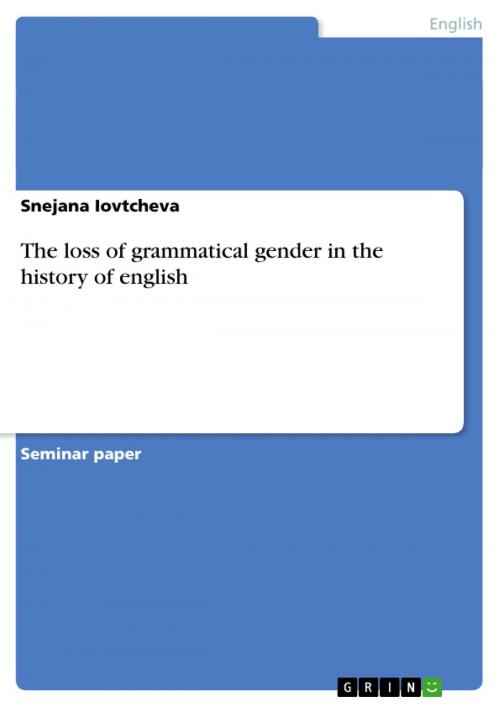The loss of grammatical gender in the history of english
Nonfiction, Entertainment, Drama, Anthologies| Author: | Snejana Iovtcheva | ISBN: | 9783638876223 |
| Publisher: | GRIN Verlag | Publication: | December 13, 2007 |
| Imprint: | GRIN Verlag | Language: | English |
| Author: | Snejana Iovtcheva |
| ISBN: | 9783638876223 |
| Publisher: | GRIN Verlag |
| Publication: | December 13, 2007 |
| Imprint: | GRIN Verlag |
| Language: | English |
Seminar paper from the year 2007 in the subject English Language and Literature Studies - Linguistics, grade: A, Syracuse University (USA) (USA: Syracuse University), 6 entries in the bibliography, language: English, abstract: This paper analyzes the question of how and why grammatical gender got lost in English. In order to do so, it reviews the recent literature on gender shifts in Old English and Middle English. The paper identifies several theoretical explanations based on both diachronic studies of English and general theoretical studies of gender. More concretely, the paper discusses the work of Greville Corbett (1991) on gender, Anne Curzan's (2003) analysis on gender shifts in the history of English, and Charles Jones's (1988) assumption of a possible paradigm shift in Old English. At the same time, older studies are given as an example for why certain premises did not work in the past. The paper first coments the relationship of English within the language families, provides a linguistic definition of grammatical gender, and describes major properties of the Modern English gender systems as well as those of the Old English gender system. It looks at the morphological and syntactic changes that triggered a shift in the English gender system. It is argued that not only external changes but also an underlying paradigm shift induced the demise of grammatical gender in Old English. In addition, the role of the personal pronouns is analyzed. According to Curzan (2003) and Corbett (1991) the role of the personal pronouns may prove to be the key in explaining the shift in the gender system.
Seminar paper from the year 2007 in the subject English Language and Literature Studies - Linguistics, grade: A, Syracuse University (USA) (USA: Syracuse University), 6 entries in the bibliography, language: English, abstract: This paper analyzes the question of how and why grammatical gender got lost in English. In order to do so, it reviews the recent literature on gender shifts in Old English and Middle English. The paper identifies several theoretical explanations based on both diachronic studies of English and general theoretical studies of gender. More concretely, the paper discusses the work of Greville Corbett (1991) on gender, Anne Curzan's (2003) analysis on gender shifts in the history of English, and Charles Jones's (1988) assumption of a possible paradigm shift in Old English. At the same time, older studies are given as an example for why certain premises did not work in the past. The paper first coments the relationship of English within the language families, provides a linguistic definition of grammatical gender, and describes major properties of the Modern English gender systems as well as those of the Old English gender system. It looks at the morphological and syntactic changes that triggered a shift in the English gender system. It is argued that not only external changes but also an underlying paradigm shift induced the demise of grammatical gender in Old English. In addition, the role of the personal pronouns is analyzed. According to Curzan (2003) and Corbett (1991) the role of the personal pronouns may prove to be the key in explaining the shift in the gender system.















